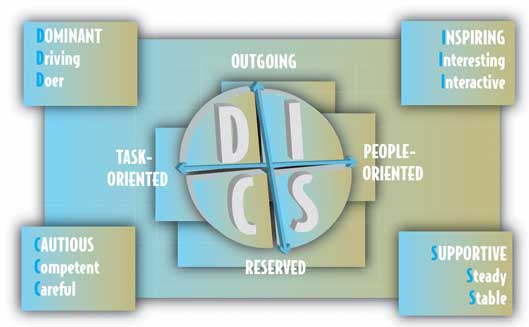Some health and fitness professionals have the natural ability to connect with others immediately—if this describes you, consider yourself one of the lucky ones. Fortunately, for those of us who could use some help in this area, connecting with others is a skill that can be learned and perfected over time.
If you want to improve your ability to make instant connections with new people, being able to identify their personality types can help. While each of us has our own unique personality, we can also be classified into general types. The American Council on Exercise Health Coach certificationuses the DISC Model developed by Dr. William Marston to categorize different personality types. The DISC Model identifies four general types of personality: dominant, inspiring, cautious or supportive, which can be further characterized as outgoing, reserved, task-oriented or people-oriented.
As health and fitness professionals, one of the ways that we communicate with others is through the exercises we assign during a workout. Not all people will respond to a particular exercise the same way. While some may love the challenge of performing as many reps as possible in a given period of time, others may prefer working with others to accomplish a physical task. Understanding the characteristics and traits of different personality types can help you to identify the most effective ways to design exercise programs for their specific needs.
Here is a breakdown of the four personality types, along with exercise recommendations for each:

Dominant Personalities:
- Fast-paced
- Direct
- Results-oriented
- Thrive on challenge
- Problem-solving
These individuals typically enjoy both one-on-one and group environments, as long as they feel they are sufficiently challenged or have the chance to quantify their results. Competitions or tracking metrics like number of reps performed, time for distance or amount of weight lifted may challenge these individuals to work harder.
Exercise Ideas:
- As many reps as possible AMRAP) in a specific time
- Keep track of reps performed in an AMRAP and try to beat them the next time
- Competitions
Inspiring Personalities:
- Outgoing
- Interactive
- People-oriented
- Decision-makers
- Connect easily with others
- Having fun
These outgoing individuals typically prefer the group environment where they have the opportunity to work with others; they may also be your front-row participants who thrive on the social aspect of exercise. The process of working with others may be more preferable than a specific performance outcome.
Exercise Ideas:
- Partner drills
- Team or group-based activities
- Small-sided games
- Dance-based classes
Cautious Personalities:
- Reserved
- Task-oriented
- Less emotion
- Prefer data and facts
- Purposeful
- Prefer own space
- Follow the rules
These individuals typically prefer exercising on their own as opposed to being in a group. May not be motivated by challenges, but more interested in tracking their workouts through data like heart rate, amount of weight lifted or the time to complete an assigned workout.
Exercise Ideas:
- Cardio machines—reach a certain distance or maintain a specific heart rate
- Circuit weight training
- Tracking metrics like body-fat percentage, amount of weight lifted or distance run
Supportive Personalities:
- Reserved
- People-oriented
- Fast-movers
- Decision-makers
- Desire to be appreciated
- Promote collaboration
Because they are considered reserved, these individuals may prefer small-group training programs that focus on everyone working toward the same (or similar) goal(s). Taking the opportunity to provide these individuals with specific feedback and appreciation can go a long way to establishing a long-term relationship with this client.
Exercise Ideas:
- “Biggest Loser” type challenges
- Small-group programs that are outcome-based, such as wedding prep, training for an obstacle
It is worth noting that these behavior types are NOT set in stone; every individual can exhibit characteristics from each type based on the context of the situation. If you take the time to understand the different personality types, how to identify them and, most importantly, how to design exercises for their needs, you will enhance your ability to establish an instant connection with new people. If you want to add to your fitness toolbox to improve the way you connect, communicate and work with others, consider becoming an ACE Certified Health Coach




 by
by 









 by
by